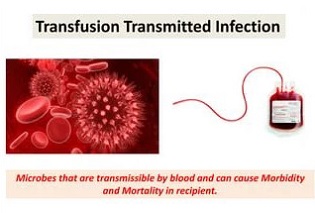BREAKING! Prince Of Songkhla University Medical Researchers Reveal Concerning Data On Transfusion-Transmitted Infections In Southern Thailand!
Nikhil Prasad Fact checked by:Thailand Medical News Team Apr 05, 2024 1 year, 9 months, 2 weeks, 1 day, 40 minutes ago
Thailand Medical: Many of us simply assume that all blood transfusions that anyone receives at hospitals during medical procedures and treatments are safe as we have always been given assurances by blood banks and agencies like the Red Cross that blood supplies are safe. However as more and more studies emerge, some of the data revealed on blood transfusion-transmitted infections are concerning and questions the quality control and procedures involved to ensure that donated blood supplies are free from pathogens or any other bio contaminants.
 Prince Of Songkhla University Medical Researchers Reveal
Prince Of Songkhla University Medical Researchers Reveal
Concerning Data On Transfusion-Transmitted Infections In Southern Thailand
This is especially so with current ongoing SARS-CoV-2 crisis and the fact that new data is showing that not only are those who have been exposed to the virus showing various hematological issues but worse, the billions that have received the COVID-19 mRNA vaccines are also exhibiting various blood disorders.
https://www.thailandmedical.news/news/breaking-japanese-researchers-warn-about-risks-associated-with-blood-transfusions-from-covid-19-mrna-vaccinated-individuals
Blood safety remains a paramount concern in healthcare systems worldwide, necessitating rigorous screening protocols to minimize the risk of transfusion-transmitted infections (TTIs) such as hepatitis B virus (HBV), hepatitis C virus (HCV), human immunodeficiency virus (HIV), and syphilis. This
Thailand Medical News delves into a study conducted by researchers at Prince of Songkhla University, Songkhla, Thailand that was aimed at exploring the impact of COVID-19 on blood donor characteristics and the prevalence of TTIs in southern Thailand from 2018 to 2022. However,
Thailand Medical News was alarmed by the data it revealed and are instead focusing more on the issue of the worrisome presence of transfusion-transmitted infections.
For instance, the fact that the prevalence of contracting HIV via a blood transfusion was 31 per hundred thousand (pht) in the South of Thailand was already a worrying sign. It will be an interesting to know what that figure is for Northern Thailand, Bangkok and North-East Thailand and also for the whole country! For hepatis virus B or HBV, the figure for Southern Thailand was even higher at 243 pht!
Understanding Transfusion-Transmitted Infections
TTIs represent a significant public health challenge globally, despite being rare in many countries. The burden of HIV, viral hepatitis, and sexually transmitted infections underscores the critical need for robust screening and testing protocols in blood transfusion services. Particularly in Thailand, the prevalence of chronic HBV and HCV infections accentuates the importance of vigilant monitoring and intervention strategies.
The COVID-19 Pandemic's Impact on Blood Transfusion Services
The emerg
ence of the COVID-19 pandemic brought unprecedented challenges to blood transfusion services. Disruptions in healthcare services, coupled with population movement restrictions and social distancing measures, resulted in critical shortages in blood supply. This study aims to dissect the ramifications of COVID-19 on blood donor characteristics and the prevalence of TTIs, providing crucial insights for public health interventions.
Methodology and Data Analysis
The study encompassed a robust analysis of data from 65,511 blood donors over a five-year period, categorized into pre-COVID-19 (2018–2019) and during COVID-19 (2020–2022) groups. Various socio-demographic factors, including age, gender, occupation, and blood type, were meticulously examined alongside the prevalence rates of TTIs - HBV, HCV, HIV, and syphilis. Statistical analyses, including chi-square tests and correlation coefficients, were employed to assess relationships between TTIs prevalence and donor characteristics.
Prevalence of Transfusion-Transmitted Infections
The prevalence rates of TTIs were as follows:
-Hepatitis B Virus (HBV):
Overall prevalence: 243 per hundred thousand (pht)
Pre-COVID-19 period: 278 pht
During COVID-19 period: 217 pht
Male prevalence: double that of females
Highest prevalence among clerics (741 pht) and government/state employees (631 pht)
-Hepatitis C Virus (HCV):
Overall prevalence: 32 pht
Pre-COVID-19 period: 32 pht
During COVID-19 period: 31 pht
Prevalence associated with age, occupation, and donor experience
Human Immunodeficiency Virus (HIV):
Overall prevalence: 31 pht
Pre-COVID-19 period: 25 pht
During COVID-19 period: 34 pht
Prevalence fluctuated significantly across age groups and donor types
Syphilis:
Overall prevalence: 118 pht
Pre-COVID-19 period: 112 pht
During COVID-19 period: 122 pht
Higher prevalence among males, first-time donors, and certain occupations
These figures illustrate the dynamic nature of TTIs prevalence, showcasing both fluctuations and consistent patterns across different infection types and donor demographics.
Impact of Household Income on TTIs Prevalence
While previous studies have suggested a link between TTIs prevalence and income, this study found no significant correlation between household income and TTIs prevalence among donors in southern Thailand. The analysis considered data from various provinces, emphasizing the multifaceted nature of factors influencing TTIs prevalence beyond income levels.
COVID-19's Influence on TTIs Prevalence
The study revealed nuanced shifts in TTIs prevalence during the COVID-19 period:
HBV: Decreased significantly by 21.8%
HCV: Remained stable with minor fluctuations
HIV: Experienced an increase of 36.4%
Syphilis: Showed a slight rise of 9.2%
These changes underscore the complex interplay between external factors like pandemics and internal factors such as donor behavior and screening protocols.
Discussion and Recommendations
The discussion delves into the implications of these findings, emphasizing the need for proactive measures in blood safety. Recommendations include targeted education campaigns, enhanced screening protocols, and diversified donor recruitment strategies to mitigate TTIs risk effectively.
Conclusion
In conclusion, the study provides invaluable insights into TTIs prevalence dynamics and blood donor characteristics in southern Thailand, especially amid the COVID-19 pandemic. The nuanced analysis of prevalence rates, demographic factors, and pandemic influences underscores the importance of adaptive healthcare strategies and continuous monitoring to ensure blood safety and public health resilience.
More such studies should be conducted and more specific studies detailing the possible dangers associated with those that have been infected with SARS-CoV-2 and also those that had received the mRNA vaccines should be conducted.
The study findings were published in the peer reviewed journal: Scientific Reports (Nature.)
https://www.nature.com/articles/s41598-024-57584-z
For the latest on transfusion-transmitted infections, keep on logging to
Thailand Medical News.
